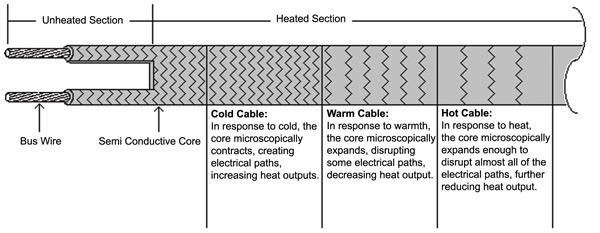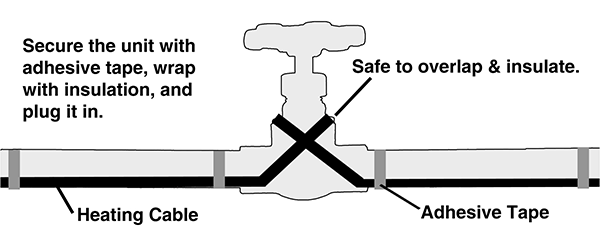You have no items in your shopping cart

24/7 Customer Service

Satisfaction Guarantee

Fast Delivery

Reasonable Price
SpeedTrace Pre-Assembled Self-Regulating Heating Cable
BriskHeat SpeedTrace heating cables are an ideal solution for easy-to-install pipe freeze protection and safe thawing of metal and plastic pipe & valve assemblies. May be used on metal and plastic water pipes, for pipe heating, but not on flexible vinyl tubing (such as garden hoses). SpeedTrace heating cable self-regulates the pipe heating cables temperature by automatically adjusting electric cable heat output based on surface and ambient temperatures. Plug-and-Play easy to install pipe heating solution! No electrical work! No electrician!
5 watts/ft (16 watts/m) at 50°F (10°C)
8 watts/ft (26 watts/m) at 50°F (10°C)
- Automatically adjusts heat output based on surface and ambient temperatures
- No temperature controller is required
- Plug-in ready pre-assembled power cord
- Grounded design for added safety
- Suitable for extreme cold conditions as low as -40°F (-40°C)
- Safe for indoor and outdoor use
- Safe to overlap heating cable for easy installation
- Use with INSUL-LOCK DS foam insulation for maximum thermal efficiency
Need Custom Lengths? Checkout our Cut-to-Length Self-Regulating Heating Cable to order based on your pipe length needs.
![]() For more information on How-To Install Pipe Heating Cable, click here
For more information on How-To Install Pipe Heating Cable, click here
-
Supply voltage: 110-120VAC or 208-277VAC
-
Nominal Power Output
- SpeedTrace: 5 watts/ft (16 watts/m) at 50°F (10°C)
- SpeedTrace Extreme: 8 watts/ft (26 watts/m) at 50°F (10°C)
-
Maximum exposure temperature 150°F (65°C)
-
Moisture and flame resistant thermoplastic elastomer outer jacket
-
16 AWG bus wires
-
Pre-terminated 30” (76cm) long power cord with
- 110-120VAC: Standard 3-prong grounded plug (NEMA-5-15)
- 208-277VAC: Bare wire leads

How Self-Regulating Cable Works

-
The semi-conductive core material contains a graphite network, which allows electricity to flow from one bus wire to the other. When the core is dense and colder, there are many paths for electricity to take through the graphite network, producing more heat.
-
Since the core material expands as it heats, the graphite network is elongated, disrupting some of the paths. More and more paths are disrupted as heating continues until the system reaches self-controlled thermal stability. When the core material cools, it contracts, reconnecting some of the electrical paths in the graphite network, and more equivalent heat is produced.
-
This temperature response occurs independently at each point along the heater. If an externally produced high temperature occurs next to a low temperature in the cable, each section of heating cable will adjust its own heat output in relation to its own local requirements.

Let us help!












